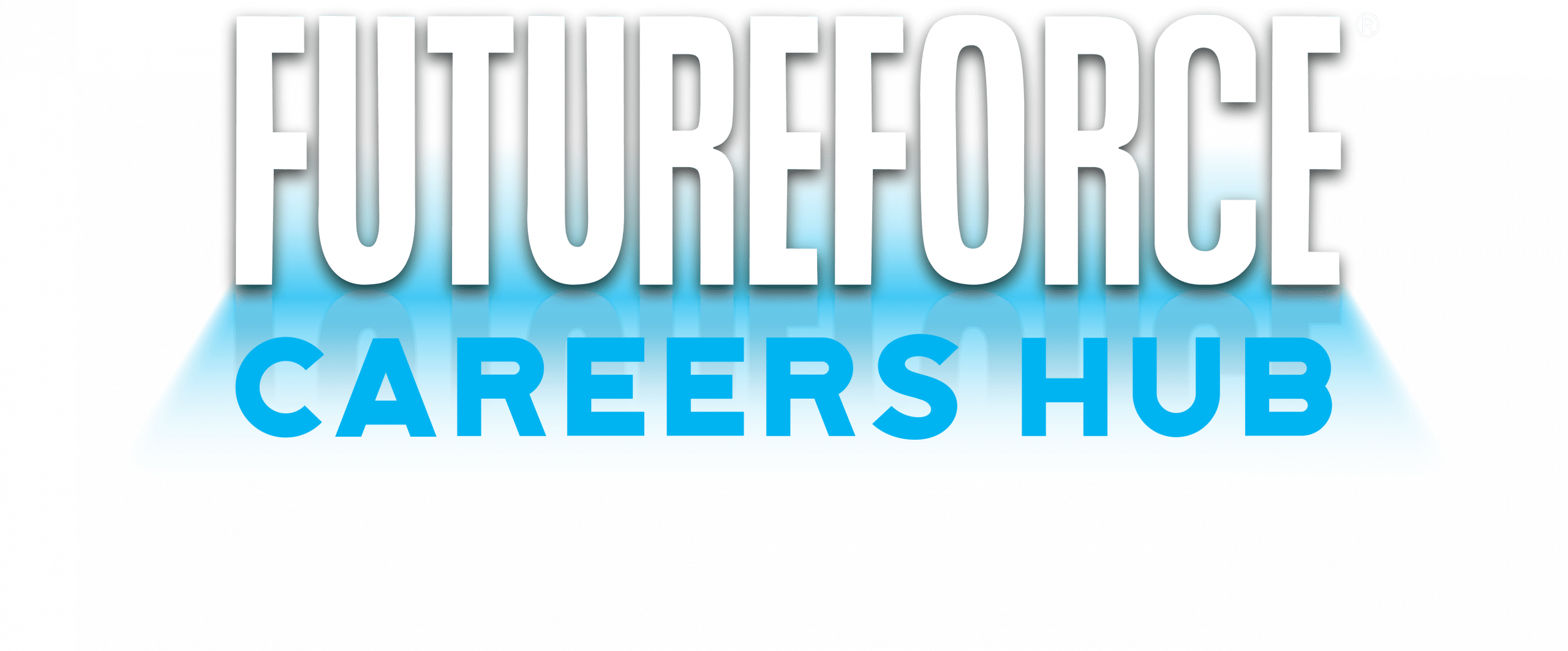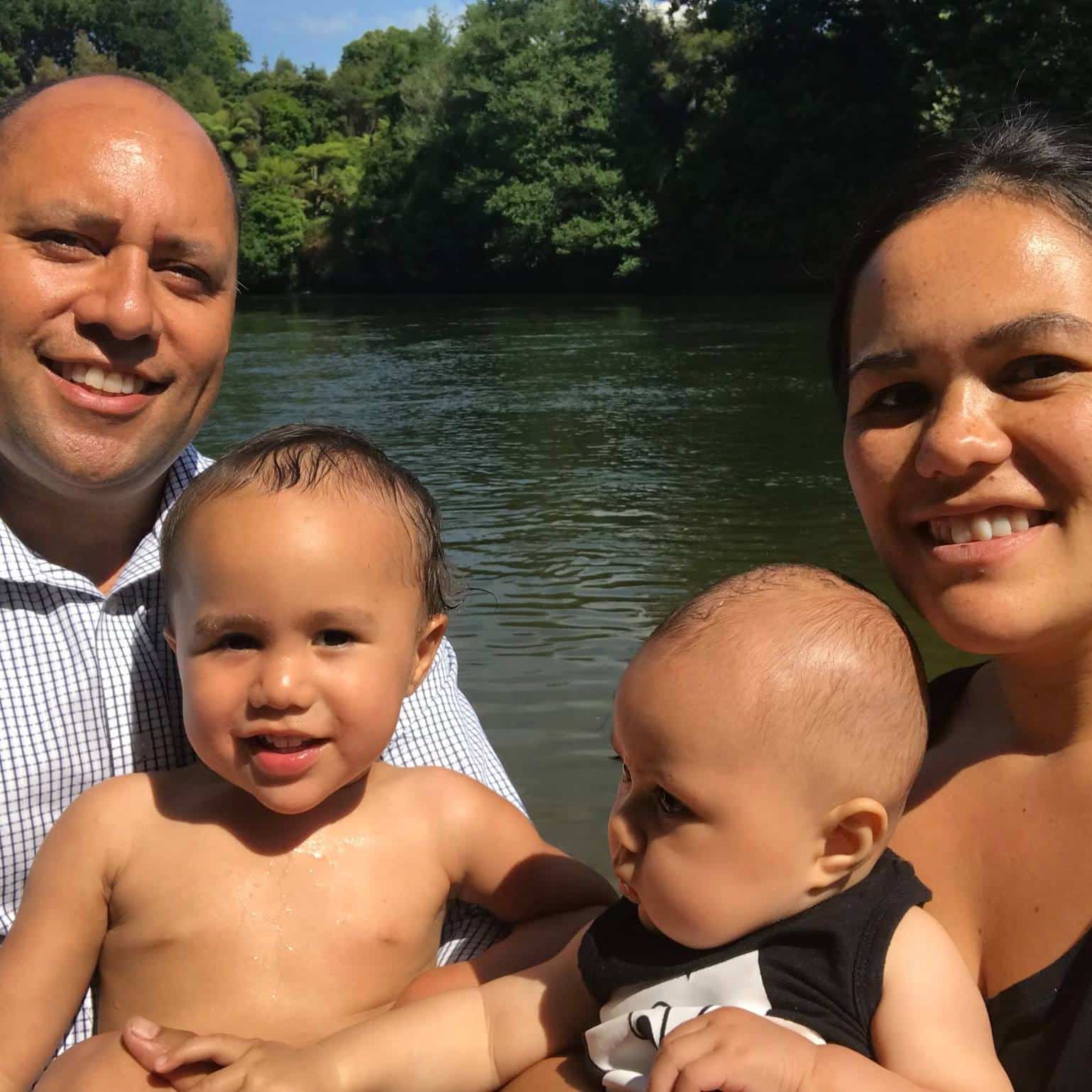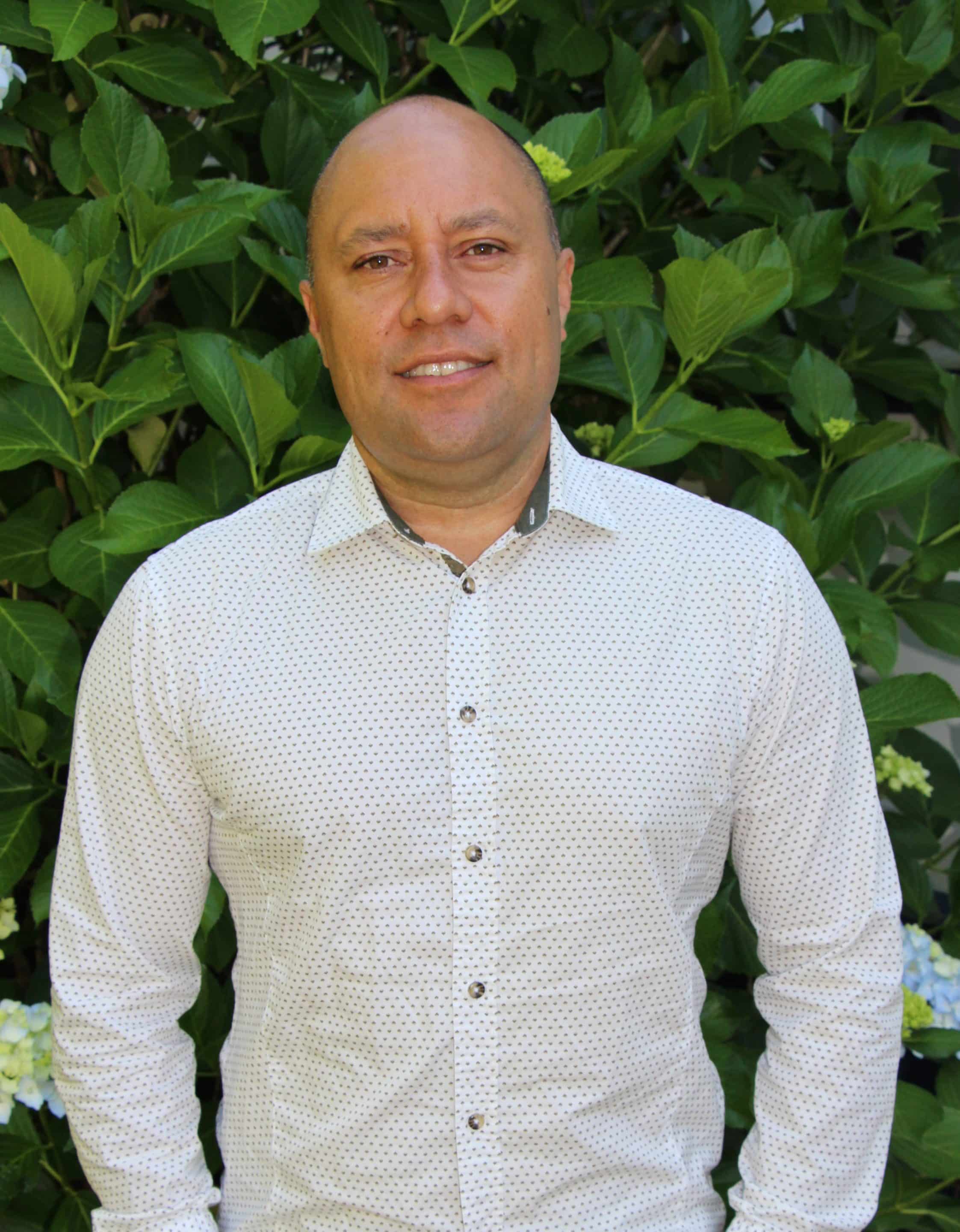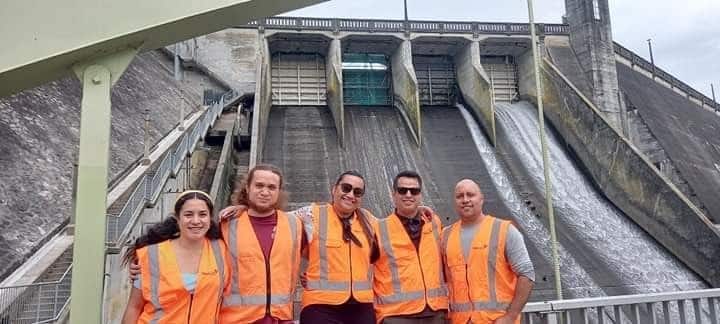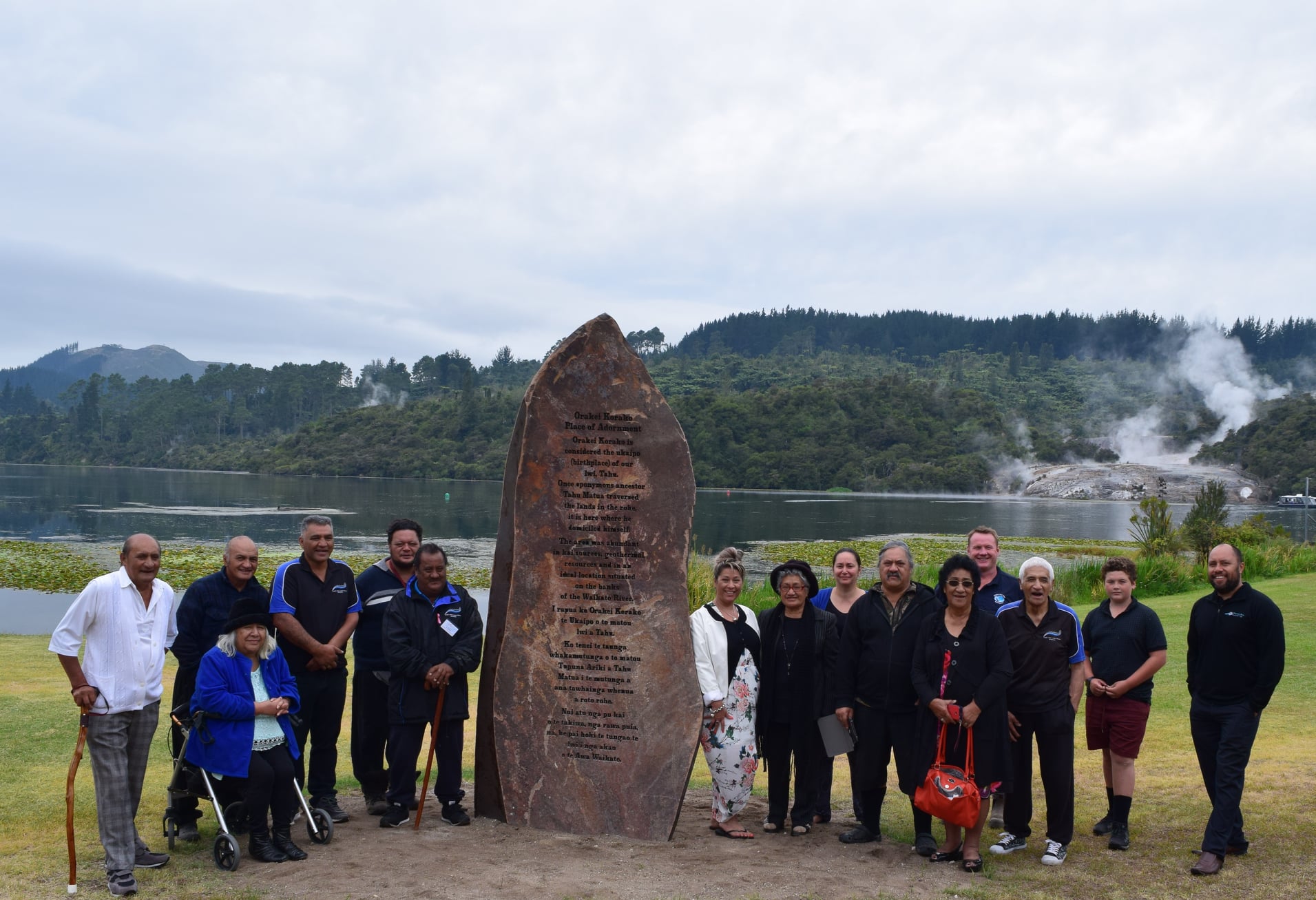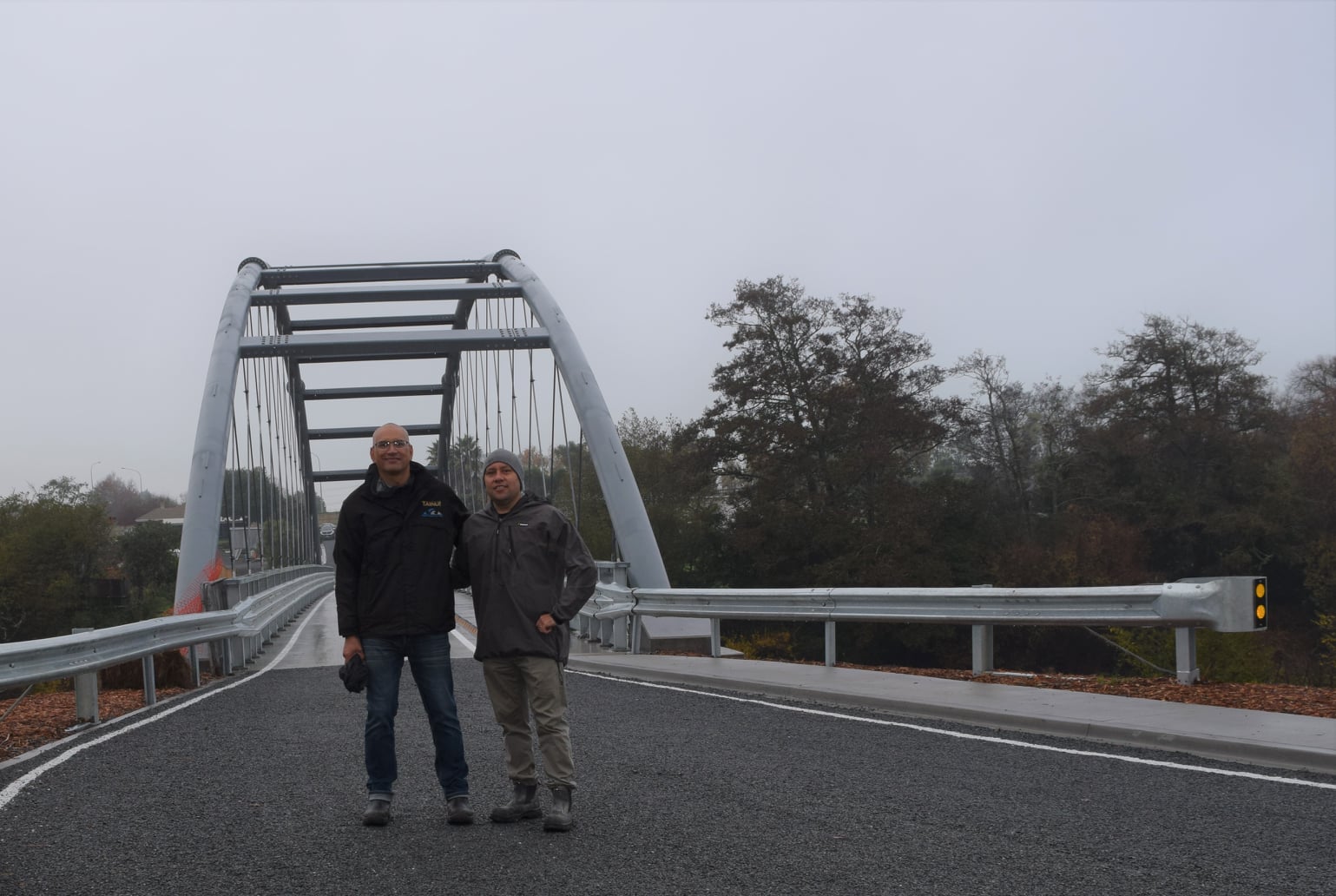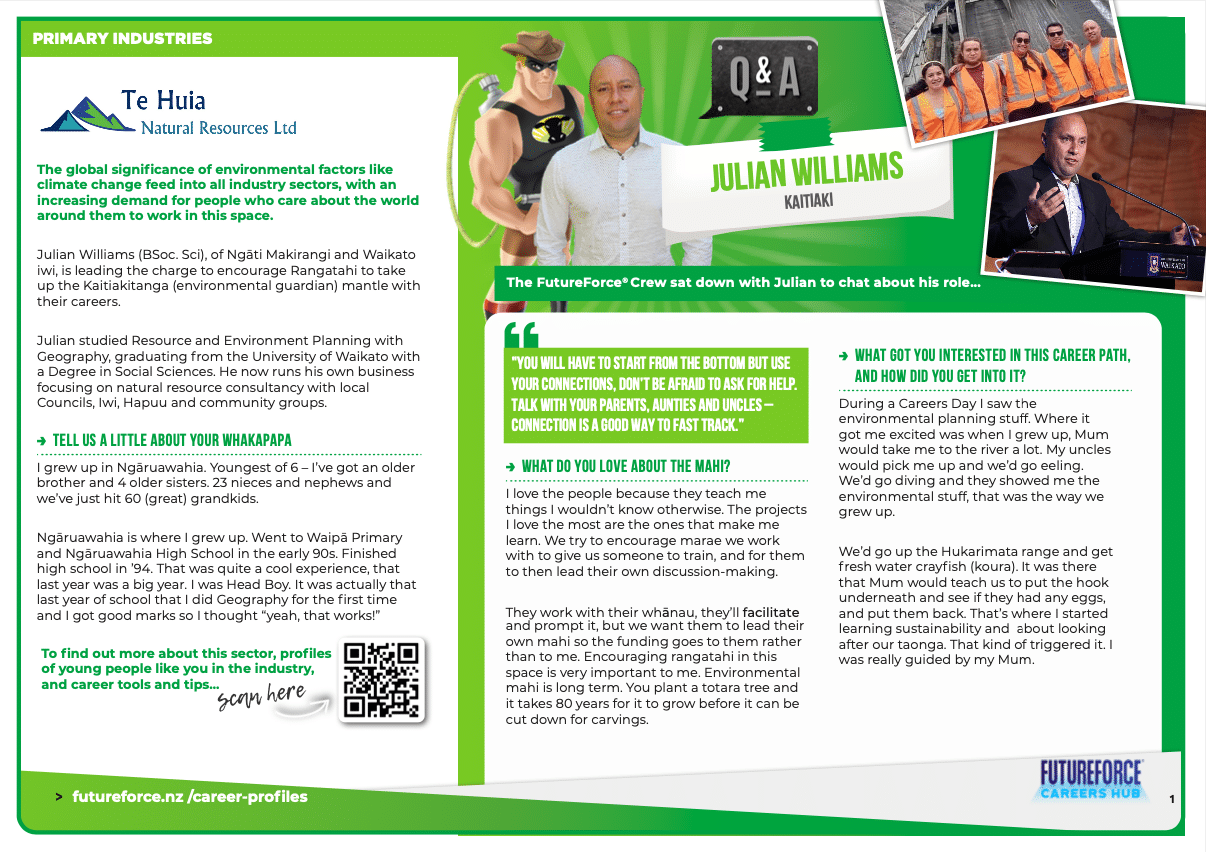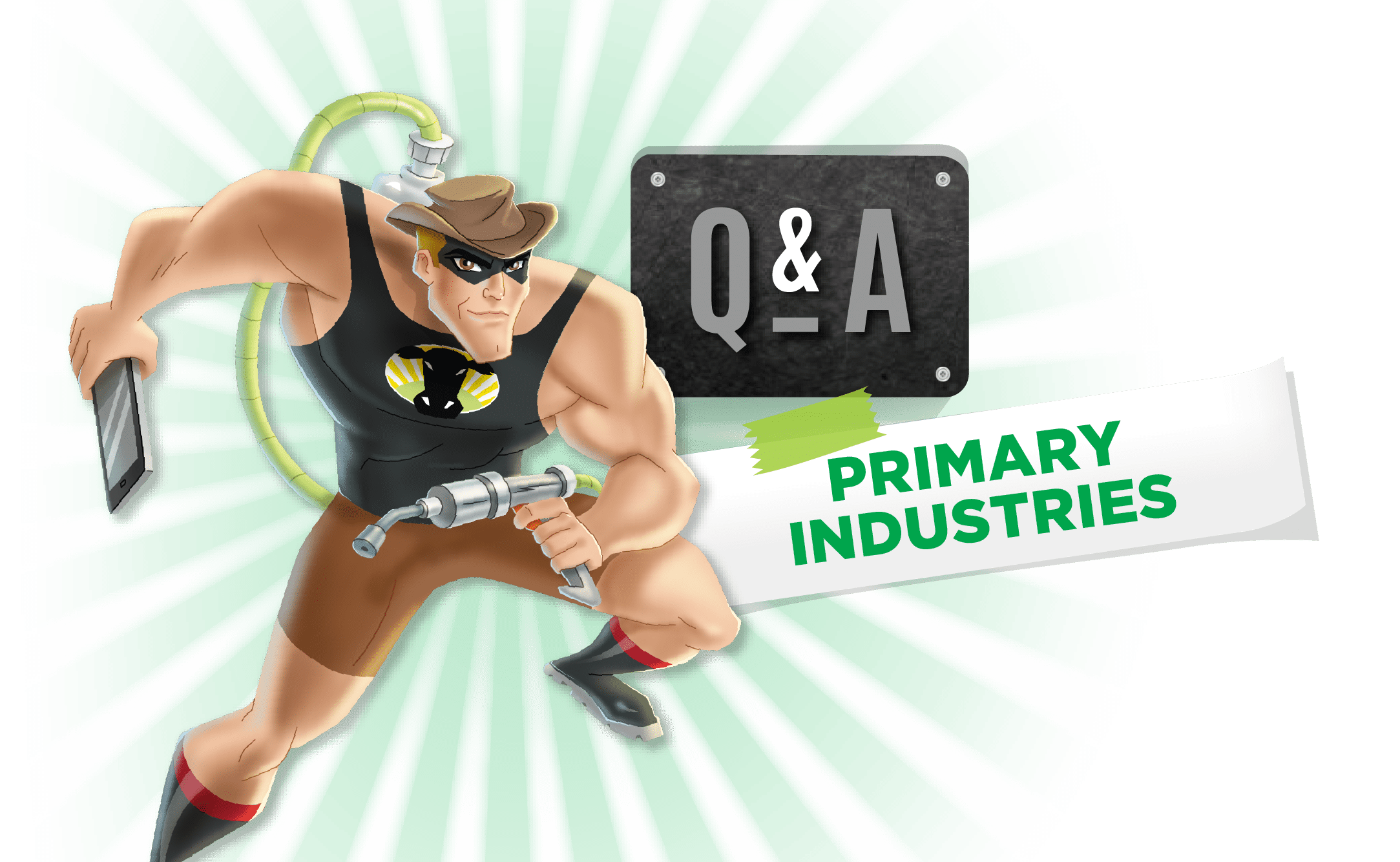
Kaitiaki Careers: Environmental
The global significance of environmental factors like climate change feed into all industry sectors, with an increasing demand for people who care about the world around them to work in this space.
Julian Williams (BSoc. Sci), of Ngāti Makirangi and Waikato iwi, is leading the charge to encourage Rangatahi to take up the Kaitiakitanga (environmental guardian) mantle with their careers.
Julian studied Resource and Environment Planning with Geography, graduating from the University of Waikato with a Degree in Social Sciences. He now runs his own business focusing on natural resource consultancy with local Councils, Iwi, Hapuu and community groups:

The FutureForce® Team sat down with Julian Williams, to talk about his mahi – how he got where he is, and what’s to come…
JULIAN WILLIAMS
Top Career Tip
“Advice from my Mum: if you’re not earning, you’re learning. One or the other. Even if it’s learning an instrument! Keep your mind going and learn something until you’ve worked out what you want to do.”
Getting to Know Julian
Julian Williams
Former Ngāruawahia High School Student
Tell us a little about your whakapapa
I grew up in Ngāruawahia. Youngest of 6 – I’ve got an older brother and 4 older sisters. 23 nieces and nephews and we’ve just hit 60 (great) grandkids.
Ngāruawahia is where I grew up. Went to Waipā Primary and Ngāruawahia High School in the early 90s. Finished high school in ’94. That was quite a cool experience, that last year was a big year. I was Head Boy. It was actually that last year of school that I did Geography for the first time and I got good marks so I thought “yeah, that works!”
What got you interested in this career path, and how did you get into it?
During a Careers Day I saw the environmental planning stuff. Where it got me excited was when I grew up, Mum would take me to the river a lot. My uncles would pick me up and we’d go eeling. We’d go diving and they showed me the environmental stuff, that was the way we grew up.
We’d go up the Hukarimata range and get fresh water crayfish (koura). It was there that Mum would teach us to put the hook underneath and see if they had any eggs, and put them back. That’s where I started learning sustainability and about looking after our taonga. That kind of triggered it. I was really guided by my Mum.
What was your career journey up to this point?
When I was in high school, the jobs I had were in apple orchards and working at petrol stations.
Following university I moved up to Huntly and went to work for a place called Wāhi Whānui and I was their environmental officer. Then I went to Fonterra for a couple of years. In 2003, Waikato Tainui asked if I could go and help do the river settlement. From then on we started negotiating for the river settlement work, talking to all of our kaumatua, all of our marae about what they want in the river. It kind of snowballed from there… I worked for the iwi until 2015, and then decided to set up Te Huia Natural Resources Limited.
Let’s talk about Te Huia Natural Resources…
Huia is named after my mother – my Mums name is Jesse Te Huia. Te Huia was a princess of my hapu, Ngāti Makirangi. We thought if we operate under Mum’s name we’d pick the right projects and act appropriately as if she’s watching us. The mahi we do is a lot of environmental policy for example things like working with Hamilton City Council and their district plan programme. Our main mahi is around water and climate change. As well, groups like Waka Kotahi come to us for help with Māori engagement. We generally try to find mutual benefits for everyone and remind councils of their obligations to iwi Māori under Te Tiriti o Waitangi.
What do you love about the mahi?
I love the people because they teach me things I wouldn’t know otherwise. The projects I love the most are the ones that make me learn. We try to encourage marae we work with to give us someone to train, and for them to then lead their own discussion-making.
They work with their whanau, they’ll faciliate and prompt it, but we want them to lead their own mahi so the funding goes to them rather than to me. Encouraging rangatahi in this space is very important to me. Environmental mahi is long term. You plant a totara tree and it takes 80 years for it to grow before it can be cut down for carvings.
Why should more people consider environmentally-focused jobs?
Environmentally focused jobs are critical for the future we are facing as a planet. Global recognition of climate change, managing carbon emissions, the scarcity of water – all things that we rely on to live – mean careers in this area are growing. We’re starting to put environment before business now so if we want a future as a people, we need to start taking care of our taonga. In New Zealand we need thousands of people to join in and take part of this mahi. We need monitors, scientists and engineers to consider how to implement environmentally-focused values into their work.
People tend to think environmental work is about going out and planting plants, but it’s a whole range of work. Even big companies need to factor in environmental factors – where are they sourcing their plastics from? Is it sustainable? How are they transporting their goods?
There’s a whole range of skills involved and because of the global significance of the environment, environmental factors drip feed into all industry sectors. When you add in the Iwi Māori component and Aotearoa uniqueness, this adds on a whole extra layer of environmentally-focused work.
What type of people should consider these careers?
If you have good people skills, understand tikanga, if you are a generous thoughtful person you can easily work in these spaces.
Our people, Māori, are like anyone – if you bring a packet of biscuits you can have a chat. But in these spaces we need to learn to not go straight to the reason why we’re here: whakawhanaungatanga. Talk about life with them first before you go into talking business. How are they, how is their whānau? Questions like that.
Julian’s Career Advice for Rangatahi
What do you wish you knew when you left school?
I wish I had a base of knowledge like FutureForce® Careers Hub. When I was in school I did not know what my career was going to be, and I wish I’d known the range of options out there. Knowing about salaries, what you need to get there, also knowing what support is there. I wondered what my options were to get to University from Ngaruawahia. Having it all there in one spot would have been helpful.
You will have to start from the bottom but use your connections and don’t be afraid to ask for help. Talk with your parents, aunties and uncles – these connections are a good way to fast track.
What does someone need to know when starting out at work?
Learn not to be afraid of money. If you can help it try not to go into debt. You can manage debt, look after your life, and save at the same time. Don’t be afraid to invest and lose and take risks, if you can afford to.
What challenges have you had to overcome?
Learning to manage my own company at first was hard – things like business administration, managing finances, valuing yourself to put yourself out there. With experience, support and belief in myself, I was able to push through this initial challenge.
I’ve seen some forms of racism, but not blatant, and I know our kaumatua have so we’re learning from those to make sure they don’t happen again.
How do you maintain a good work/life balance?
Get outside and look after your health. Don’t just focus on your mahi, focus on looking after yourself. I have a tight group of friends who if one us gets a health check, the rest of us are also motivated to get a health check. Focus on everything around and outside of your work – I do believe you can achieve a balance of life.
So what’s next… what’s the dream future?
My dream is that Māori have a big multinational consultant company. Around the motu we have engineers, social scientists, etc – we just haven’t come together. We could deliver all of the projects ourselves instead of, as Māori, being add-ons to other companies projects.
For me and my family, my wife and I want to help our brothers and sisters into houses. I want my nieces and nephews to know that you don’t have to be an employee – and I want to learn from them! If you can make a grand or so off of multiple streams of income, ka pai. We want to help our nieces and nephews by establishing connections for them. Because we’re in a position to help others now, we really want to lean into that.
For my boys when they grow older, I want them to eventually go forth and create their own pathways. For now they’re young so I want them to continue learning before they start earning.
Top Career Tip
“You will have to start from the bottom but use your connections, don’t be afraid to ask for help. Talk with your parents, aunties and uncles – connection is a good way to fast track.”
